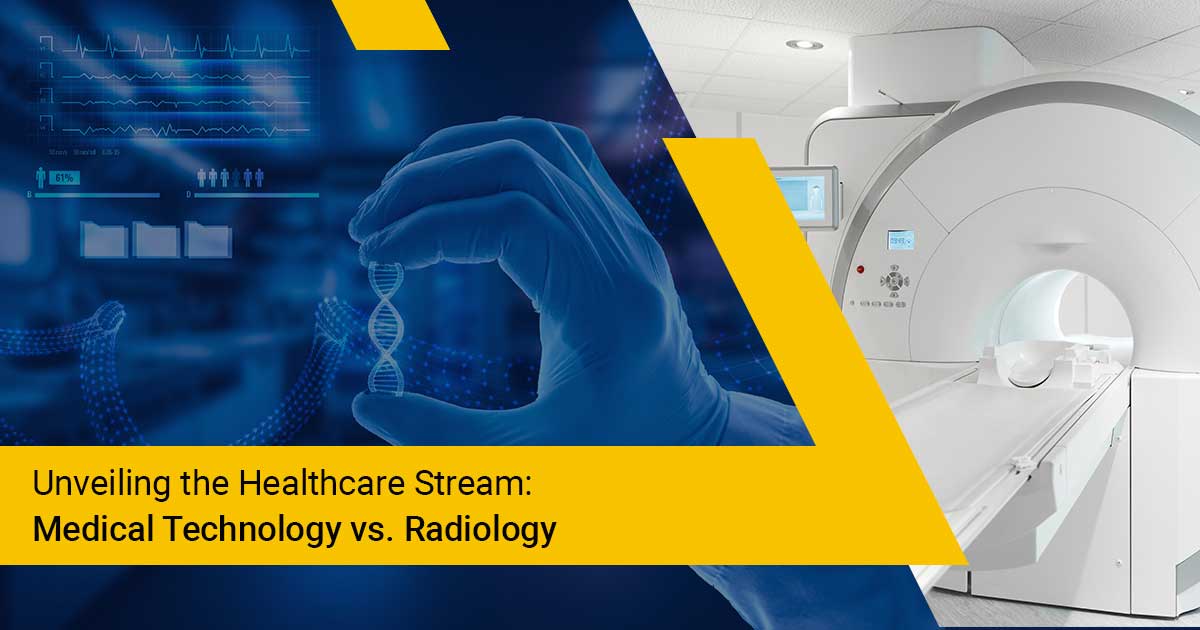Blog Detail


Unveiling the Healthcare Stream: Medical Technology vs. Radiology
16-01-2024

You can become a part of the noble profession of medicine without investing 5 years to do an MBBS and another 5 years for MD and other super-specialisations. Medical Technology and Radiology are growing fields as the field of medicine blends extensive use of technology for diagnosis and treatments. Globally, there are many interesting opportunities in the healthcare stream and the demand for qualified and talented professionals will not stop
Radiology Overview
| Course Name | Course Duration | Course Curriculum |
| Certificate Programme in Radiology | 6-months |
|
| Diploma in Radiology | 2 years 6 months |
|
| B.Sc. Radiology B.Sc.Radiotherapy B.Sc. Radiography |
3 years |
|
| B. Voc. Studies Radiology and Imaging Technology | 3 years |
|
| MSc. Medical Radio Imaging | 2 years |
|
Career Scope in Radiology
Radiology is one of the exciting domains in the medical field with hefty pay packages and high demand. Radiologists can work with large corporate hospitals, independent medical practitioners, and government hospitals or set up independent clinics and work on referrals. Some of the roles of radiologists are –
- Radiographer - they take X-rays to help doctors
- Radiology Technician - they take X-rays, CT scans, MRI scans and work with diagnostic equipment
- Ultrasound Technician/ Diagnostic Medical Sonographer - they scan the body using ultrasound and sonograms to create images
- MRI Technician - operate MRI scanners
- CT Scan Technologist - use computerised tomography (CT) equipment to diagnose medical conditions
Medical Technology Overview
One can pursue the following courses in medical technology -
| Course Name | Course Duration | Course Curriculum |
|
6 months |
|
|
1 year |
|
| B.Sc.Medical Lab Technology | 3 years |
|
| Bachelor in Medical Technology | 3 years + 6 months internship |
|
|
1 year |
|
| M.Sc. Medical Lab Technology | 2 years |
|
Career scope in Medical technology
Medical technologists study clinical laboratory procedures and work closely with medical practitioners to collect and analyse bodily samples for various procedures, diagnoses and treatments. Medical technicians typically work in biochemistry, pathology, and microbiology labs. The various specialisations are –
- Cytologists study cells and
- Haematologists study blood samples
- Serologists study body fluid samples
- Histologists study body tissue
- Pathologists study Urine analysis, blood banking and microbiology
Medical technologists perform laboratory tests, document results, conduct pathological investigations, maintain test quality, and operate medical equipment.
The confluence of technology and research for Medicare
AI, robotics and computer and mobile applications are seamlessly integrating themselves into the medical field. Computer applications are being designed and adopted for medical data management, patient history record maintenance and sharing, studying samples by setting parameters and much more. Experiments are being conducted for using robotics and AI for sensitive operations. There is a great surge in demand in the healthcare IT field for technicians, who can ensure smooth hospital-wide operations.
Research is underway to automate the various tests to ensure greater accuracy and faster diagnosis. So, aspirants in the field can consider dual majors in computer science, AI and Robotics.
There are many exciting and lucrative opportunities for medical research. One can work in building and improving technologies for medical examinations. You can also research to find cures by creating new test methodologies, testing parameters, and researching pathogens among other things.
Who must consider these fields?
If you have a scientific bent of mind and are interested in the field of healthcare and medicine, then you can consider medical technology and radiology. You can work in
- Medical equipment manufacturing companies
- Laboratories
- Medical Research centres
- Pharmaceutical companies
- Government or private hospitals
- Independent clinics and diagnostic centres.
Medical technologists and researchers closely with doctors and help them with the diagnosis process. They are in charge of procurement and maintenance of new equipment and in designing the laboratory apparatus and storage. The role requires teamwork, meticulous planning, and organisational skills. Radiologists have to coordinate with many staff members to ensure smooth operations.
Radiologists and medical technologists are as busy as doctors, nurses, and other medical practitioners. So, if you want to work in the medical field, and contribute to the healthcare system, you can consider medical technology or radiology fields. At the undergraduate level, the students will learn the core science and technology-related subjects. Depending on the course you sign up for, your specialisation will be established. With a graduate degree, one can start their career working as an assistant technician. To specialise in any field, head a department, or set up a clinic or diagnostics centre, one will require administrative and management skills.